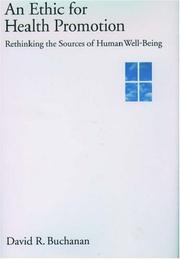| Listing 1 - 6 of 6 |
Sort by
|
Book
ISBN: 2130475779 9782130475774 Year: 1996 Volume: 3094 Publisher: Paris PUF
Abstract | Keywords | Export | Availability | Bookmark
 Loading...
Loading...Choose an application
- Reference Manager
- EndNote
- RefWorks (Direct export to RefWorks)
Mass communications --- Communication in medicine --- Communication en médecine --- geneeskunde (medische aspecten) --- medische praktijk --- gezondheidsinformatie (gezondheidsopvoeding, gezondheidspromotie) --- media (pers, communicatie) --- médecine (aspects médicaux) --- pratique médicale --- information en santé (éducation sanitaire, promotion de la santé) --- médias (presse, communication) --- Physician-Patient Relations. --- Community-Institutional Relations. --- Communication in medicine. --- Communication en médecine

ISBN: 019513057X Year: 2000 Publisher: Oxford [etc.] : Oxford University Press,
Abstract | Keywords | Export | Availability | Bookmark
 Loading...
Loading...Choose an application
- Reference Manager
- EndNote
- RefWorks (Direct export to RefWorks)
What are the goals of health promotion and the most appropriate means of achieving them? The prevailing view is that these goals are to prolong life and reduce mortality rates. Since the leading causes of morbidity and mortality are now largely attributable to lifestyle behaviors--smoking, diet, exercise, etc.--the means of achieving reductions in heart disease, cancer, strokes, diabetes and other chronic conditins are to identify more effective techniques for changing people's behavior. Virtually all health promotion research is currently directed towards accomplishing this objective. But at what cost? As researchers strive for more effective ways to change people's behavior, what are the implications for individual autonomy, integrity, and responsibility? Buchanan sets out to explain why a science of health promotion is neither imminent or estimable. He argues that health promotin is inescapably a moral and political endeavor and that goals more befitting the realization of human well-being are to promote self-knowledge, individual autonomy, integrity, and responsibility through putting into practice more democratic processes of self-direction and mutual support in civil society.
Health promotion --- Moral and ethical aspects. --- Philosophy. --- #GBIB:CBMER --- gezondheidsinformatie (gezondheidsopvoeding, gezondheidspromotie) --- preventie --- ethiek (ethische aspecten) --- information en santé (éducation sanitaire, promotion de la santé) --- prévention --- ethique (aspects ethiques) --- Health promotion programs --- Health promotion services --- Promotion of health --- Wellness programs --- Preventive health services --- Health education --- Moral and ethical aspects --- Philosophy

ISBN: 1840145722 Year: 1998 Publisher: Aldershot Ashgate
Abstract | Keywords | Export | Availability | Bookmark
 Loading...
Loading...Choose an application
- Reference Manager
- EndNote
- RefWorks (Direct export to RefWorks)
This work addresses the moral, social and political problems emerging from the practice of healing and caring, biomedical research and the provision of health care services. The primary aim of many professional bioethicists is, of late, to solve as efficiently as possible, the problems encountered by health care providers and scientists in clinical, laboratory and administrative settings. Seen from the viewpoint of applied philosophy however, this is a dangerous tendency if the grounds for the suggested solutions are not properly examined. Even choices which are harmless and seem to involve no immoralities can be directly hazardous if those making choices appeal to dubious ethical principles or inaccurate data. This is why the book is dedicated to the examination of the reasons that people can and should have for their health-care related decisions as well as to the formulation of good solutions to difficult problems. It covers criteria in life and death situations, voluntary euthanasia and medical paternalism, wrongful medical authoritarianism, health education, preventive medicine and the welfare of the population, AIDS, discrimination and legal restrictions, and health-care policy-making.
Human rights --- Medical ethics. --- Medical policy --- Health aspects. --- Moral and ethical aspects. --- vrijheid --- euthanasie --- gezondheidsinformatie (gezondheidsopvoeding, gezondheidspromotie) --- preventieve geneeskunde --- aids (HIV) --- gezondheidszorgbeleid --- liberté --- information en santé (éducation sanitaire, promotion de la santé) --- médecine préventive --- sida (VIH) --- politique des soins de santé --- Medical ethics --- Basic rights --- Civil rights (International law) --- Rights, Human --- Rights of man --- Human security --- Transitional justice --- Truth commissions --- Health care policy --- Health policy --- Medical care --- Medicine and state --- Policy, Medical --- Public health --- Public health policy --- State and medicine --- Science and state --- Social policy --- Biomedical ethics --- Clinical ethics --- Ethics, Medical --- Health care ethics --- Medicine --- Bioethics --- Professional ethics --- Nursing ethics --- Social medicine --- Health aspects --- Moral and ethical aspects --- Law and legislation --- Government policy
Book
ISBN: 9026305273 Year: 1981 Publisher: Baarn Amboboeken
Abstract | Keywords | Export | Availability | Bookmark
 Loading...
Loading...Choose an application
- Reference Manager
- EndNote
- RefWorks (Direct export to RefWorks)
BMLIK
vondelingen --- Antwerpen --- Patient education --- arts-patiëntrelatie --- communicatie --- ethiek (ethische aspecten) --- gezondheidsinformatie (gezondheidsopvoeding, gezondheidspromotie) --- psychologie (psychologische aspecten) --- recht op niet weten (recht op weten) --- recht (wetgeving, rechtspraak, rechtsbeginselen, juridische aspecten, aansprakelijkheid) --- medische ethiek --- patiëntenbegeleiding --- patiëntenparticipatie --- #gsdb6 --- #SBIB:309H517 --- #SBIB:316.334.3M40 --- relation médecin-patient --- communication --- ethique (aspects ethiques) --- information en santé (éducation sanitaire, promotion de la santé) --- psychologie (aspects psychologiques) --- droit de ne pas savoir (droit de savoir) --- droit (aspects juridiques, législation, jurisprudence, principes de droit, responsabilité) --- 61 --- 362.11 --- Verbale communicatie: sociale psychologie van de taal en de interactie, psycholinguistiek --- Medische sociologie: zorgenverstrekkers, relatie met hulpvragers --- Patient education. --- Education of patients --- Patients --- Sick --- Health education --- Education
Book
ISBN: 288146081X 9782881460814 Year: 1997 Publisher: Lausanne Réalités sociales
Abstract | Keywords | Export | Availability | Bookmark
 Loading...
Loading...Choose an application
- Reference Manager
- EndNote
- RefWorks (Direct export to RefWorks)
Cet ouvrage analyse la place et l'évolution de la médecine dans le contexte socio-politico-économique contemporain en mettant l'accent sur la transformation des attitudes individuelles et collectives par rapport aux risques, à la santé et à la vie.
Médecine --- Médecine sociale --- Santé publique --- Économie de la santé --- Soins médicaux --- Éthique médicale --- Ethics, Medical --- Patient Advocacy --- Health Promotion --- Health Care Costs --- Quality Assurance, Health Care --- Philosophie --- Geneeskunde - Geneeskunst --- Volksgezondheid --- Medische ethiek --- gezondheidszorg --- Filosofie der geneeskunde --- volksgezondheid --- gezondheidseconomie (gezondheidszorgeconomie) --- kosteneffectiviteit (kosten-en-batenanalyse) --- gezondheidsinformatie (gezondheidsopvoeding, gezondheidspromotie) --- preventie --- ethiek (ethische aspecten) --- sociologie (sociologische aspecten) --- socio-economische aspecten (socio-economische factoren) --- Médecine - Art de guérir --- Ethique médicale --- soins de santé --- Philosophie de la médecine --- santé publique --- économie de la santé (économie des soins de santé) --- analyse coût-bénéfice --- information en santé (éducation sanitaire, promotion de la santé) --- prévention --- ethique (aspects ethiques) --- sociologie (aspects sociologiques) --- aspects socio-économiques (facteurs socio-économiques) --- Médecine - Philosophie
Book
ISBN: 9782868203861 2868203868 Year: 2009 Publisher: Strasbourg Presses universitaires de Strasbourg
Abstract | Keywords | Export | Availability | Bookmark
 Loading...
Loading...Choose an application
- Reference Manager
- EndNote
- RefWorks (Direct export to RefWorks)
Donner, recevoir un organe. Quoi de plus simple a priori ! Quoi de plus beau, mais quel challenge ! La transplantation relève d'une révolution thérapeutique qui continue d'évoluer à grands pas. Elle peut permettre de vrais " miracles ". En même temps, ces gestes ne manquent pas de complexité. L'organe, objet du don, n'est pas une pièce mécanique qu'il suffirait de prendre et de reposer ailleurs, bien que certains préfèrent le penser ainsi. Le prélèvement touche à l'intégrité du corps, que le donneur soit décédé ou vivant. Quant à la greffe, elle passe par une intrusion dans les profondeurs du corps humain, réveillant le plus archaïque du développement, quand se joue la structuration de l'identité de la personne. Donner, recevoir un organe, n'est donc pas anodin et requiert des précautions certes médicales, mais également éthiques. Les auteurs du présent ouvrage explorent non seulement les progrès récents du don et de l'accueil d'organes humains, mais aussi ses enjeux psychologiques, anthropologiques, sociologiques, économiques, religieux... Se trouvent ici réunis aussi bien des témoins, des membres d'associations, que des médecins et des experts de nombreuses disciplines - examinant non seulement les résultats positifs mais aussi les inconvénients, les aléas et les dérives. Mais autour de la " transmission de vie ", selon l'expression de Jean-Luc Nancy, il faut oser une parole résolument juste.
Medical law --- Professional ethics. Deontology --- Tissue and Organ Procurement --- Organ Transplantation --- Bioethics --- ethics --- legislation and jurisprudence --- BPB0911 --- Transplantation d'organes --- transplantatie (orgaantransplantatie, weefseltransplantatie, allocatie van organen, donorschaarste) --- donatie (donorschap, donor, levende donor, orgaandonatie) --- godsdienst (religie, religieuze aspecten) --- antropologie (culturele antropologie, antropologische aspecten) --- gezondheidsinformatie (gezondheidsopvoeding, gezondheidspromotie) --- Orgaantransplantatie --- transplantation (transplantation d'organes, transplantation de tissus humains, greffe d'organes, pénurie d'organes, allocation d'organes) --- don (donneur, donneur vivant, don d'organes) --- religion (aspects religieux) --- anthropologie (anthropologie culturelle, aspects anthropologiques) --- information en santé (éducation sanitaire, promotion de la santé) --- μεταμόσχευση οργάνων --- organtransplantation --- orgaantransplantatie --- organtransplantering --- presađivanje organa --- presajanje organov --- elinsiirto --- przeszczepianie narządów --- elundite siirdamine --- szervátültetés --- transplantace orgánů --- trapianto di organi --- organ transplant --- transplantácia orgánu --- transplant organi --- orgānu transplantācija --- organų persodinimas --- trapjant ta’ organi --- transplantação de orgãos --- трансплантација органа --- пресадување органи --- transplant de organe --- trasplante de órganos --- трансплантация на органи --- Organverpflanzung --- organų transplantavimas --- darcovstvo orgánov --- prelievo di organi --- transplantát --- szervbank --- odber orgánov --- dhurues i organit --- αφαίρεση οργάνων --- organo donoras --- Organbank --- донирање органи --- colheita de orgãos --- odběr orgánů --- prélèvement d'organes --- orgaanbank --- пресадување орган --- Organentnahme --- dádiva de orgãos --- organ graft --- elundisiirdamine --- dhurim organesh --- donazione di organi --- uttag av organ --- bankë e organeve --- transplantim organi --- eksplantacija organa --- organbank --- organo davėjas --- don d'organes --- grefe de organe --- organo transplantavimas --- orgānu banka --- банка за чување органи --- doação de orgãos --- organdonor --- banca di organi --- orgaandonor --- donation of organs --- προσφορά οργάνου --- organdonation --- elintenluovutus --- fjernelse af organer --- banka orgánov --- organų donorystė --- banco de orgãos --- davatelj organa --- organų bankas --- enxerto de orgãos --- трансплантација на органи --- inplanting van organen --- greffe d'organes --- innesto di organi --- transplantat --- donación de órganos --- extracción de órganos --- transplantacija --- afstaan van organen --- elintenluovuttaja --- elinsiirrännäinen --- orgānu ziedošana --- донор на орган --- banka orgánů --- organdonering --- elundidoonorlus --- Transplantation --- bancă de organe --- Organspender --- Organspende --- darca orgánu --- donație de organe --- organ bank --- donor --- wegnemen van organen --- banco de órganos --- elundipank --- organ donor --- banque d'organes --- szervdonor --- dárcovství orgánů --- orgāna donors --- elundidoonor --- transplantāts --- пресадување ткиво --- elinpankki --- trasphlandú orgán --- Organ Transplantation - ethics --- Bioethics - legislation and jurisprudence
| Listing 1 - 6 of 6 |
Sort by
|

 Search
Search Feedback
Feedback About UniCat
About UniCat  Help
Help News
News